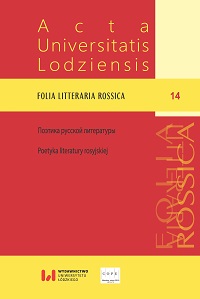Мотив палингенесии в мегатексте Первой мировой войны
DOI:
https://doi.org/10.18778/1427-9681.14.11Ключевые слова:
мегатекст, сверхтекст, мифопоэтика, поэзия, Первая мировая войнаАннотация
В статье рассматриваются стихотворения русских и белорусских авторов, написанные в период Первой мировой войны и напрямую связанные с этим историческим феноменом. Наличие общей смысловой установки на преодоление смерти и разрушения позволяет объ- единить данные тексты в мегатекст. Проблемы, связанные со спецификой формирования и бытования сверхтекстовых образований, прочно вошли в состав приоритетных в иссле- довательской практике, сложившейся в современном литературоведении. Диапазон такого рода политекстуальных единств, обретающих традицию научного описания, постепенно расширяется. В этой связи вопрос о возможности рассмотрения текста Первой мировой войны как мегатекста вполне закономерен и требует разрешения. Мегатекст принято по- нимать как синтетический сверхнасыщенный текст, который сохраняет следы «внетек- стового субстрата». Мегатекст Первой мировой войны, на наш взгляд, является сложным семиотическим образованием и имеет мифопоэтическую природу. Анализ лирики перио- да первых лет Первой мировой войны показывает, что авторы, принадлежащие к разным литературным направлениям и школам, а также разным национальным литературам, под влиянием, по всей видимости, общей смысловой установки создавали произведения, вос- производящие одну и ту же модель мира. Судить о данной модели мира можно, опираясь на образы-мотивы, к которым мы относим образы пожара, в том числе мирового, в соче- тании с образами еды. Единство этих образов можно обозначить как мотив палингенесии, который свидетельствует о субстратной для данного мегатекста мифологеме перерождения, воскресения. Особенность преломления проблемы жизни и смерти в мегатексте Первой ми- ровой войны заключается в том, что вечное возвращение и перерождение теперь приводит не к обновлению, а к движению в цикле между смертями: после гибели в мировом пожаре мир не возрождается, как этого следовало бы ожидать. Циклический по своей природе ми- фологический сюжет в данном мегатексте реализуется в виде кумулятивной цепочки.
Скачивания
Библиографические ссылки
Blok, Aleksandr A. Polnoe sobranie sochinenii i pisem: v 20 t. Moskva: Nauka, 1997–2014.
Google Scholar
Bryusov, Valerii Ya. Sobranie sochinenii: v 7 t. Moskva: Khudozhestvennaya literatura, 1973.
Google Scholar
Byadulya, Zmitrok. Zbor tvoraў: u 5 t. Mіnsk: Mastatskaya lіtaratura, 1985–1989.
Google Scholar
Freidenberg, Olga M. Poetika syuzheta i zhanra, ed. N. V. Braginskaya. Moskva: Labirint, 1997.
Google Scholar
Kolas, Yakub. Zbor tvoraў: u 7 t. Mіnsk: Dzyarzhaўnae vydavetstva BSSR, 1952.
Google Scholar
Kupala, Yanka. Poўny zbor tvoraў: u 9 t. Mіnsk: Mastatskaya lіtaratura, 1995–2003.
Google Scholar
Lebedev, Andrei V. Palingenesiya. In: Filosofskii entsiklopedicheskii slovar, ed. L. F. Ilichev. Moskva: Sovetskaya entsiklopediya, 1983: 475.
Google Scholar
Lotman, Yurii M. Tekst v tekste. In: Izbrannye stati: v 3 t. Vol. 1. Tallinn: Aleksandra, 1992: 148–160.
Google Scholar
Toporov, Vladimir N. Peterburgskii tekst russkoi literatury. Sankt-Peterburg: Iskusstvo – SPB, 2003.
Google Scholar
Tyupa, Valerii I. “Mifopoetika sopryazheniya khudozhnika i zhizni”. Novyi filologicheskii vestnik. No. 3 (2011): 122–137.
Google Scholar












